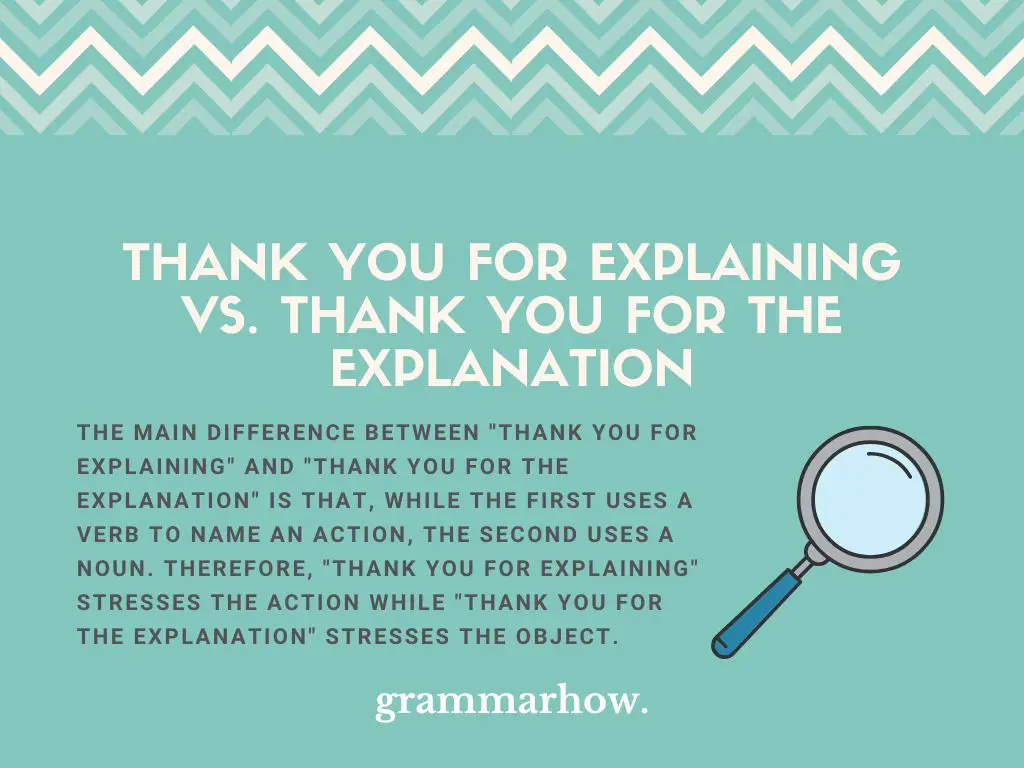Sometimes, we get “thank you for explaining” when we make something clear for someone but some other times we get “thank you for the explanation”. Is there a difference between these terms? Are they interchangeable? Read on, because the answers to these questions with helpful examples are coming next.
Thank You for Explaining vs. Thank You for the Explanation
The main difference between “thank you for explaining” and “thank you for the explanation” is that, while the first uses a verb to name an action, the second uses a noun. Therefore, “thank you for explaining” stresses the action while “thank you for the explanation” stresses the object.

The difference between these terms is subtle. Therefore, “thank you for the explanation” and “thank you for explaining” are completely interchangeable in colloquial English. That being said, the second term utilizes a verb and might be considered a tad less formal while the first, utilizing a noun, can be considered more formal.
Nonetheless, they can be used interchangeably since this difference is very small and can be inexistent for most English speakers.
Thank You for Explaining
The line “thank you for explaining” is correct. It is often used to thank someone who has explained something you needed to know. The stress in this line falls over the verb “explaining” and that makes it not-so-formal. Therefore, it is common to find this line in colloquial English.
Let’s see how “thank you for explaining” can be used in some practical examples.
- Thank you for explaining to my son the importance of protection while skateboarding.
- I have no words to thank you for explaining to me the relevance of breathing while working out.
- Thank you for explaining the rules of the house, we’ll live more comfortably now.
- Hey, I have been trying to find you to say thank you for explaining; it was very useful.
- Thank you for explaining the homework to me, I couldn’t have completed it otherwise.
- Mary told me to say thank you for explaining the task to her, she found it very clarifying.
- No matter who speaks inside the classroom, you always have to say “thank you for explaining”.
Thank You for the Explanation
The line “thank you for the explanation” can be used to thank someone that has clarified a certain topic. The stress in this line is in the noun “explanation” rather than the person in the exercise of the action. Depending on the context, it can be considered a formal statement.
Let’s see some examples of how to use “thanks for the explanation” in a sentence:
- Everybody, please say thank you for the explanation to Mr. Smith.
- Let me say, in the name of the entire board, thank you for the explanation, it was crystal clear.
- Thanks for the explanation; it was vital to pass the exam.
- Everyone is saying “thanks for the explanation” but nobody put a tip in the box.
- If you are here to say thank you for the explanation, don’t worry about it; it’s my job!
- Whenever I hear “thank you for the explanation” it puts a smile on my face.
- Who said, “thank you for the explanation”? I’m not over yet, keep on taking notes!
Which Phrase Is Used the Most?
There is no tool more powerful than the almighty Google Ngram Viewer to check words’ popularity. In this case, when checking if “thank you for the explanation” or “thank you for explaining” is used the most, we found that there is a substantial difference in the use of these terms.

Moreover, if we trace a historical line to differentiate the sentences, we can say that both lines were used with a similar level of popularity until the breaking point in 1970. From that moment on, “thank you for explaining” took off while “thank you for the explanation” remained almost the same as in the 1950s.
Final Thoughts
Stressing the action as in “thank you for explaining” or stressing the object as it happens in “thank you for the explanation” has a distinct effect on the overall meaning of the line. Thus, the second version is considered by some to be a tad more formal than the first.

Martin holds a Master’s degree in Finance and International Business. He has six years of experience in professional communication with clients, executives, and colleagues. Furthermore, he has teaching experience from Aarhus University. Martin has been featured as an expert in communication and teaching on Forbes and Shopify. Read more about Martin here.
